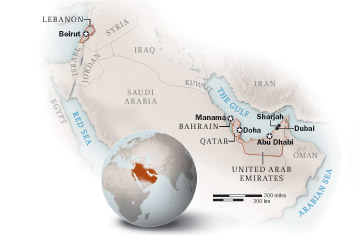
A young man runs through a ring of fire, smoke billowing behind him. Masked men flaunt machine guns on the streets of a city. Rivalries between political factions turn murderous.
All this has been seen on the streets of Beirut in the last two weeks, scenes that summon up the memory of a bitter civil war in Lebanon, and which — repeated in Gaza or Baghdad — seem to epitomize the Middle East. The region between the eastern Mediterranean and the Indian Ocean, we have come to assume, is a cursed land, where contests between those of different ethnicities and faiths, aggravated by geopolitics past and present, remain deadly, and where those who just want to build a better life are overshadowed by the bomber and the gunman.
But this is not the whole story. On the western edge of the Gulf, city-states with otherworldly landscapes — man-made islands shaped like palm trees! — are being built, the desert is being made to bloom, and smart business leaders are closing deals in glitzy hotels. The same dreams of prosperity that have lifted tens of millions out of poverty and into modernity in Asia are being made a reality in the Gulf, too.
What distinguishes the Gulf is not secularism. On the contrary, many young professionals flock to Qatar and Dubai because it is there that they find it most comfortable to be both Muslim and modern. The Gulf cities are not perfect; they are cultural infants, and their towers have been built by migrants whose living conditions can be a disgrace. But they are successful, and they are Arab. They demonstrate that there is no reason why those two adjectives should not live in the same breath — or why Beirut's fires, which were the symbol of a region's past, should illuminate its future.